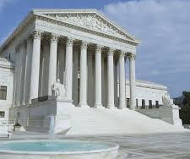Article from: www.thenewspaper.com/news/49/4947.asp
4/28/2016
US Supreme Court To Decide On DUI Laws
High court to decide whether states can impose criminal penalty for refusing a breath or blood test.
 The ways drunk driving laws are handled nationwide may fundamentally change soon. The US Supreme Court last week heard oral arguments in a pair of cases to decide whether laws in North Dakota and Minnesota that make it a crime for motorists to refuse to take a breathalyzer, urine or blood test violate the US Constitution.
The ways drunk driving laws are handled nationwide may fundamentally change soon. The US Supreme Court last week heard oral arguments in a pair of cases to decide whether laws in North Dakota and Minnesota that make it a crime for motorists to refuse to take a breathalyzer, urine or blood test violate the US Constitution.
"The fundamental problem with the statutes at issue in these three cases is that they make it a criminal offense to assert a constitutional right," attorney Charles A. Rothfeld argued on behalf of defendants. "Under laws of North Dakota and Minnesota, a person who is stopped on suspicion of impaired driving is obligated to take a warrantless chemical test to determine the alcohol content of their blood."
Rothfeld insisted that criminal refusal statutes in driving under the influence of alcohol cases (DUI) were an example of the state using an indirect method to do what it is prohibited from doing. Justice Anthony M. Kennedy wondered whether that was actually true.
"If the state can impose a civil administrative sanction, why couldn't it also impose a criminal sanction?" Kennedy asked. "We could have hypotheticals where you would just be no more than three days in jail, criminal sanction, or a three year suspension, which is obviously greater. Why should there be a difference?"
The justices wondered whether the notion of implied consent was entirely fictional. The ability to drive is for most people essential to having a job, and even if people were forced to explicitly sign an agreement to submit to testing, that consent would be coerced.
"It seems to me that the flexibility that a state has in this situation depends upon what rights the motorist has," Chief Justice John Roberts observed.
When pressed by the justices, state prosecutors were unable to come up with a practical reason for a police officer not to secure a warrant while transporting a suspect to the police station or hospital for testing. Electronic warrants are now available in forty states. Rural states like North Dakota argued such a requirement would be expensive and inconvenient.
"So that excuses you from a constitutional requirement?" Justice Sonia Sotomayor asked. "We're now going to bend the Fourth Amendment, which I always thought started on the presumption that we favor warrants -- we don't disfavor them. But since many jurisdictions seem to manage it, we give a pass to North Dakota because it doesn't want to?"
The prosecutors countered that if they are forced to seek warrants for every DUI test, they will always choose a blood because that is the only one certain to produce results. A blood draw can be forced, but a breath test cannot.
 The ways drunk driving laws are handled nationwide may fundamentally change soon. The US Supreme Court last week heard oral arguments in a pair of cases to decide whether laws in North Dakota and Minnesota that make it a crime for motorists to refuse to take a breathalyzer, urine or blood test violate the US Constitution.
The ways drunk driving laws are handled nationwide may fundamentally change soon. The US Supreme Court last week heard oral arguments in a pair of cases to decide whether laws in North Dakota and Minnesota that make it a crime for motorists to refuse to take a breathalyzer, urine or blood test violate the US Constitution.